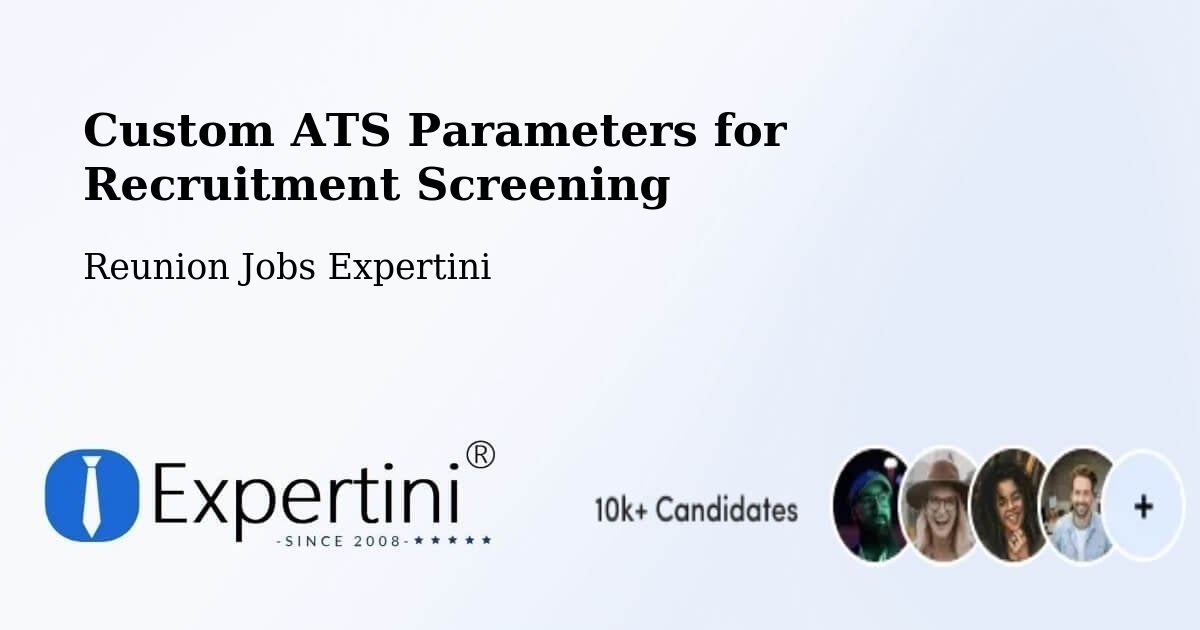Custom ATS Parameters for Recruitment Screening

Precision Screening Engine
Tailor your hiring filters with configurable AI parameters
Custom ATS Parameters for Recruitment Screening
Expertini empowers employers with customizable, AI-driven screening parameters, revolutionizing how recruitment is tailored to the precise needs of every organization, industry, and country. This unique flexibility lets recruiters define what “qualified” means for each role, fine-tuning both automated filtering and candidate prioritization while ensuring fairness and compliance.
Traditional ATS platforms often rely on inflexible, generic filters, risking the loss of strong candidates and allowing bias or inconsistency to creep in. Expertini’s ATS, however, enables organizations to set detailed requirements—such as specific skills, years of experience, education, certifications, languages, and even preferred keywords—for every open position. This is powered by NLP-driven resume parsing, deep semantic analysis, and dynamic rule application, all within a user-friendly dashboard.
Recruiters can assign different weights to criteria (for example, prioritizing industry certifications for technical roles or language fluency for regional positions), and even save templates for recurring needs. The system adapts screening logic instantly to new market trends, employer strategy, or compliance standards. Human-in-the-loop features mean hiring managers can review, approve, and adjust AI-driven recommendations at any stage.
These controls, combined with standardized scoring and de-biasing, have been proven to improve quality-of-hire and speed, as confirmed in multiple Expertini partner success stories.
Key Advantages of Expertini Customizable Screening
- ✔️ Dynamic skill, experience, and credential filters powered by NLP and explainable AI
- ✔️ Weighted scoring models for unique role, department, or location needs
- ✔️ Automated exclusion or ranking based on minimum/desired qualifications
- ✔️ Employer-configurable templates and audit-ready compliance controls
- ✔️ Built-in analytics to track screening outcomes, fairness, and improvement
- ✔️ Seamless integration with resume parsing, ranking, and interview scheduling modules
- ✔️ Must-have qualification enforcement
- ✔️ Weighted skill importance scoring
- ✔️ Experience threshold configuration
- ✔️ Scenario-based screening (X OR Y skills)
Expertini's ATS includes a customizable AI screening module that lets employers define "qualified candidates" for each role. Recruiters can set requirements like minimum experience, critical skills (e.g., "5+ years sales experience and CRM proficiency" for Sales Manager positions), education levels, and certifications - each with adjustable weights. The system uses NLP and machine learning to parse applications into structured data, then performs criteria validation with semantic understanding. As validated in Expertini's 2024 Configuration Study, employers reduced unqualified applications by 82% while maintaining 95% of qualified candidates.
-
How can employers ensure their screening matches real job requirements?
With Expertini, employers directly configure required and preferred criteria—down to specific skills, certifications, or experiences. The AI translates these settings into actionable rules for each application. Recruiters can review and edit filters anytime, ensuring every shortlist aligns with genuine business needs and market conditions.
Case Study: Tailored Talent Pipelines
A technology firm used Expertini’s customizable screening to set region-specific language requirements and industry certifications for its global sales force. Result: improved first-interview conversion rates and reduced time-to-fill by over 30%, with candidate shortlists reflecting the evolving demands of local managers.
(Expertini Success Stories, Expertini AI Documentation) -
How does Expertini support compliance and reduce bias?
Screening logic is auditable, anonymized, and standardized, so every candidate is evaluated only on the criteria that matter. Continuous feedback and analytics help organizations monitor the effectiveness and fairness of their custom rules, with built-in tools for regulatory compliance and reporting.
FAQs: Custom Screening with Expertini ATS


